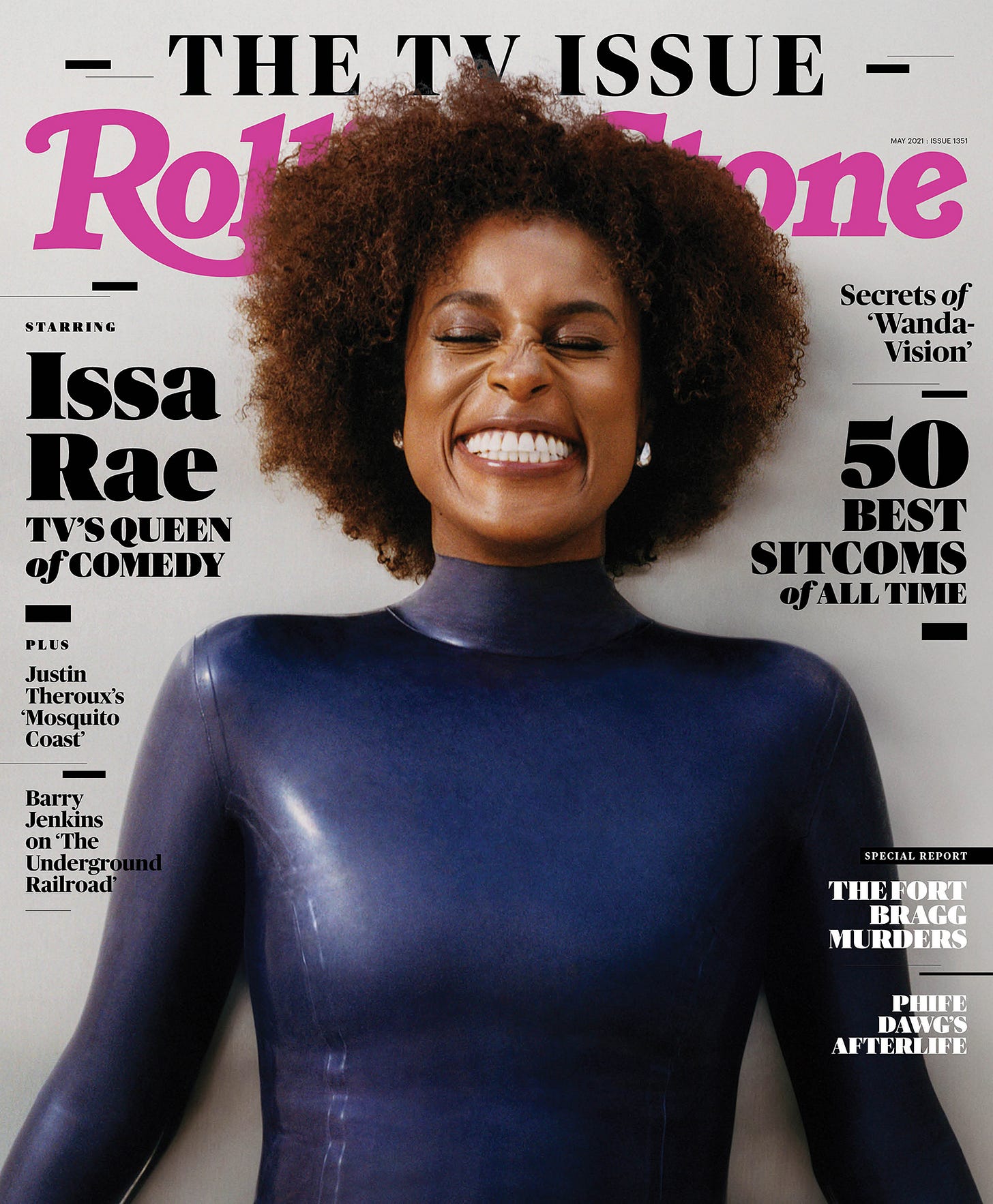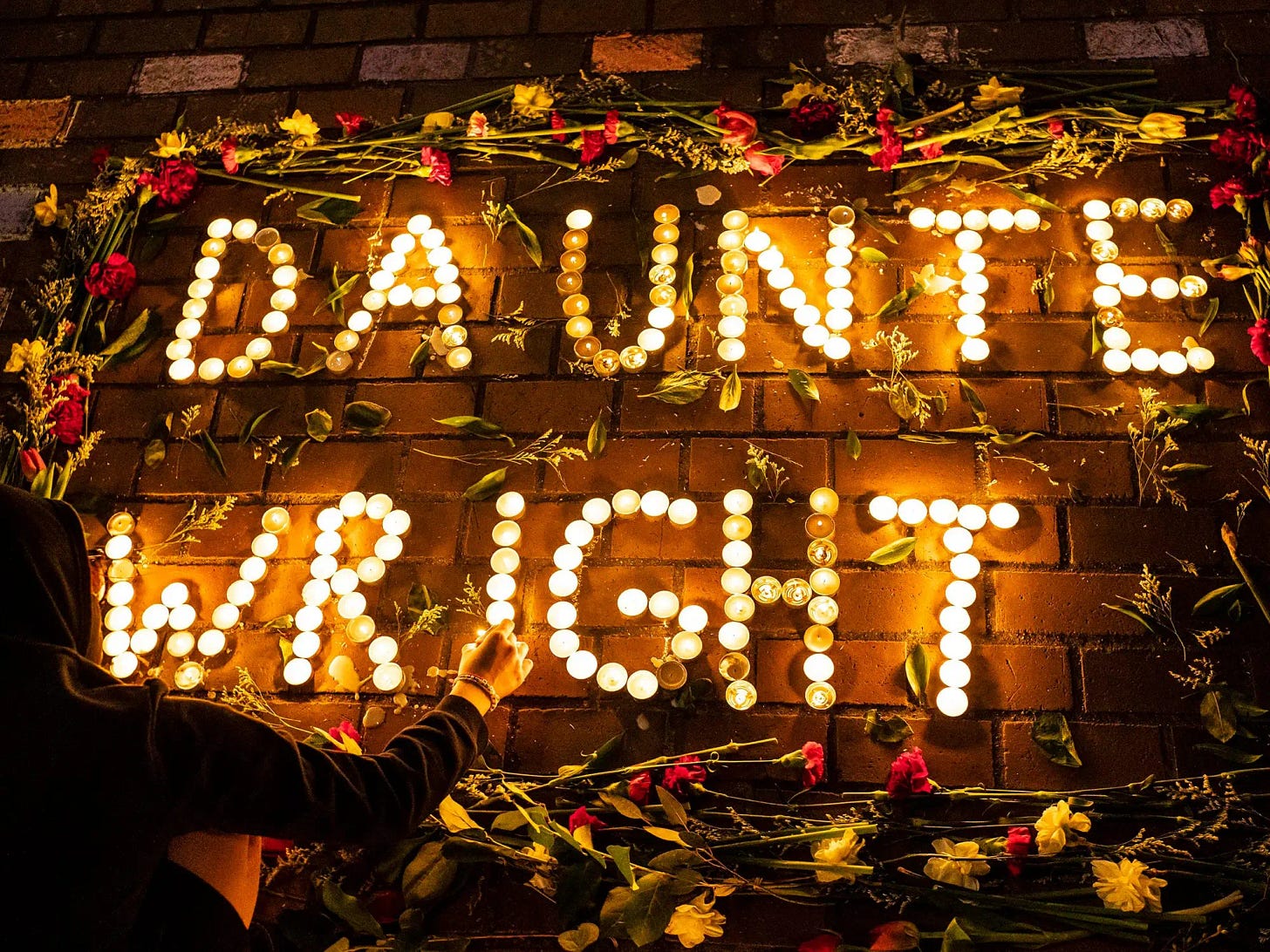The immediate takeaway from my latest story
Plus: Issa Rae’s “Rolling Stone” cover story and the newest destination on my travel bucket list.
Earlier today, an international coalition of 35 children’s and consumer groups called on Facebook CEO Mark Zuckerberg to scrap the company’s plans to develop a version of Instagram for users under the age of 13. I reached out to Facebook to get their side of the debate on how accessible social apps should be to kids. I also checked in a mom of a 5-year-old, senior counsel on global policy at one of the nonprofits that signed on to the letter, and an educator with a doctorate in educational leadership from the Harvard Graduate School of Education and who taught at every K–12 grade level to get their thoughts. The immediate takeaway: “Children should not become guinea pigs for tech companies. Just because you can make a product for a younger audience doesn’t mean you should.”
Read the full story: “The chorus against Instagram Kids grows louder”
The post is free to read and share. If you enjoy original reporting on the intersection of power, pop culture and personal identity, then you can subscribe to The Supercreator or purchase a gift subscription for a friend or colleague to support future stories like these.
In The Know
— Culture
Actress and all-around creative powerhouse Issa Rae covers the May “TV” issue of Rolling Stone in an ink-blue Vex bodysuit and jewelry by Pamela Love. The accompanying interview, written by Brittany Spanos, is full of hilarious and sharp soundbites on work-life harmony, friendship and privacy:
“I want to belong here. I want to be among the greats. I have to work to do that. It’s not enough to start things. These businesses and all these things that I’m touching still have to be great. Anybody can do this, but can they do it well? What I’m trying to prove is that I can do it well.”
“I’ve fallen short [as a friend] because I’m so used to [them] accommodating this in-person dynamic. So this year has tested who I am as a friend and really made me realize, ‘Oh, I’m not considerate in this way, and I can do more here.’ ”
“I just feel superprotective of any relationship I’m in. That’s come from observing and making fun of people over the years who broadcast the most intimate parts of their relationships, then are left with egg on their face. I call them the ‘me and my boo’ people. Let me embarrass myself. Don’t let a nigga embarrass you. That’s always been my focus.”
“I know how I am as a consumer, as a stan of people, and what I look for. I had the foresight to shield myself from what anybody who was looking for anything on me would try to find, because I know this culture. Internet culture is weird and malicious. I’ve just worked really hard to protect myself from the ugliest parts of it.”
— Politics
The House Judiciary Committee voted 25–17 yesterday to create a commission to study slavery reparations for Black Americans, advancing to the full House for the first time after it was first introduced more than 30 years ago. The bill, which would proceed to the evenly divided Senate if passed, calls for a 13-person panel to submit its findings to Congress and recommend any remedies, including compensation to Black Americans.
Six Republicans voted against advancing a bill that calls on the Justice Department to accelerate its review of anti-Asian hate crimes. 92 Senators voted for the legislation, which was sponsored by Democratic Sen. Mazie Hirono of Hawaii, the first Asian-American woman elected to the Senate.
House and Senate Democrats introduced legislation to expand the number of Supreme Court justices from nine to 13. House Speaker Nancy Pelosi said today that she doesn’t support the bill and won’t bring it to the floor. Womp womp.
Republican Sen. Mitt Romney of Utah and Democratic Sen. Kyrsten Sinema of Arizona are partners on a bill to increase the federal minimum wage. Romney didn’t share details on the proposal though.
A new report from Inspector General Michael A. Bolton found that officers responding to the Jan. 6 insurrection were forbidden from “heavier, less-lethal weapons” to protect the Capitol from the mob. That sounds about white.
— Business
“I think we need to do a better job for our employees,” outgoing Amazon CEO Jeff Bezos wrote in his final shareholder letter. His vision is for the company to be both “Earth’s safest place to work” and “Earth’s best employer,” adding: “We shouldn’t settle for 94 percent of employees saying they would recommend Amazon to a friend as a place to work. We have to aim for 100 percent. And we’ll do that by continuing to lead on wages, on benefits, on upskilling opportunities, and in other ways that we will figure out over time.” (The tech bros on Twitter have been gobbling sentences up like those all day, FYI.)
Related: Amazon added 50 million Prime subscribers during the pandemic.
ABC News named veteran TV executive Kimberly Godwin as its next president. She’s the first Black woman to lead a major broadcast network’s news division.
New research by the Global Institute for Women’s Leadership at KCL and employee advisory firm Karian and Box reported a few meaningful ways employers can create worker flexibility: Predictable or set hours, compressed days, job sharing and school term-time working, and safeguards against a two-tier workforce where those who are more regularly away from the office are overlooked for promotion and recognition.
Substack, the company that provides The Supercreator’s publishing technology, announced Substack Local, a $1,000,000 initiative focused on building local subscriber-supported news publications. Up to 30 local news writers will be selected by an independent panel of judges and receive mentorship, business support, design services and a cash advance.
— Tech
Software company Adobe is partnering with grassroots organization Emojination to expand emoji so more people feel represented. New data from 7,000 global emoji users discovered a majority of people of color and people from marginalized groups use emojis not only as a display of their own identity but as a form of representation.
Facebook announced an experiment during which users can tap on topics they’re interested in underneath posts and ads in their News Feed to explore related content from businesses. The data it collects from this engagement could then be optimized into a premium ad unit where businesses could pay for higher placement.
Related: Facebook reached its target to power its global operations entirely on renewable energy.
Lyft launched Lyft Pass for Healthcare, a program that allows health care organizations or social services to send patients prepaid passes that they can use for rides to doctor’s appointments.
Read All About It
Zak Cheney-Rice at Intelligencer on why this will keep happening:
Police seek to create safety — a nebulous state of enforced order — by deciding who is dangerous and responding to them with violence. Even as public opinion has soured on much of their conduct in the past year, this remains, to the vast majority of Americans, a key part of what law enforcement agents are supposed to do. This is evident in broad support for reforms like establishing uniform standards for how and when police can use force — paired with more or less split opinion on whether police should keep receiving military-grade weapons and equipment — compared with less popular changes aimed at eliminating the police’s right to use violence altogether, like defunding as a precursor to abolition. Even if one agrees that a United States without armed police is a dangerously utopian proposal, it is hard to dispute that anything less will preserve this discretion to apply violence based on subjective judgment — which, in turn, will continue to spark the type of heated protests we’ve seen grow larger over the past year. As long as they exist, the police will be one split-second decision away from assaulting or killing someone because they view them as a threat. People like Daunte Wright are and will continue to be casualties. This will keep happening.
Melissa Gira Grant at The New Republic on the pride police take in their death-dealing power:
Following a night of protest in Brooklyn Center, Minnesota, after an officer shot and killed a young Black man, Daunte Wright, police raised a “thin blue line” flag, under the stars and stripes. Reporters stood there getting their live shots. A video of the scene was seen nearly two million times in one day. A century ago, the NAACP would hang a black flag out the window of their office on Fifth Avenue in Manhattan, with stark white letters visible for blocks away, reading: “A Man Was Lynched Yesterday.” It was a memorial, in the sense that it observed a death, and a marker interrupting daily life in the city in motion beneath it. In Brooklyn Center, Minnesota, the flag announced death, too. With the American flag, it flew at top mast. It claimed deadly force with a mark of pride.
Kelsey Piper at Vox on how to develop vaccines faster before the next pandemic:
Some policymakers have put thought into how to better achieve that goal. One option is “prizes” that represent the social value of advancing vaccine science. With a more prize-based funding model, society would be paying for scientific advances rather than paying for doses — allowing for more vaccine research against diseases that don’t pose much of a threat but are a good testing ground for new vaccine approaches and a potential cousin to new pandemic diseases.
Christopher Littlefield at Harvard Business Review on compliments:
The interplay of surprise and self-image can make it harder to process the nice things we hear about ourselves. “People may divert praise as a way of protecting from future failure, disappointment, or rejection from others,” Denise Marigold, associate professor of social development at the University of Waterloo, Canada, told me. “The fear is that if I allow myself to let in a compliment, and feel good about it, and end up disappointing others or myself in the future, I risk taking a bigger bite out of my self-esteem.”
Carol Hymowitz at The Wall Street Journal on baby boomers:
Men and women in their 60s and older were warned early in the pandemic to isolate themselves from everyone they weren’t already living with, including their closest relatives. Many did that, and only recently have started emerging from their bubbles, thanks to vaccinations.
But a large number of these baby boomers found the isolation too painful, the loneliness too searing. So instead of sheltering in place alone, many have relocated to new homes close to their children and grandchildren, or moved in with them. Like many young adults who have returned to their parents’ homes—after losing jobs or because they need help caring for young children or would rather share space with relatives than roommates—they are creating new cross-generational households.
Multigenerational living increased sharply in 2021, with 26% of Americans living in a household with at least three generations, according to a January survey of more than 2,000 adults by Harris Poll on behalf of Generations United. That’s nearly four times the 7% of Americans who were living in a household with three generations in 2011, according to Generations United, a nonprofit that researches and advocates for intergenerational programs and policies. What’s more, 57% of those currently living in multigenerational households said they started or are continuing the arrangement because of the pandemic, the survey found.
Michael Mechanic at Mother Jones on how America’s ultrawealthy won the pandemic:
In the first three months of 2020, the combined wealth of Americans with assets of $30 million or more dipped 26%—but then bounced back almost entirely by the end of August.
The pandemic relief passed in December 2020 included a bipartisan provisionthat will save America’s wealthiest 1 percent an estimated $120 billion in taxes.
In the pandemic’s first full year, the combined net worth of 657 American billionaires increased by nearly 45%—about $1.3 trillion.
During that first pandemic year, 82 million people filed for unemployment benefits, and more than 100,000 businesses*shut down permanently.
In March 2021, more than 1 in 7 renters said they were behind on rent, as did roughly 1 in 5 renters of color. Meanwhile, 45 million Americans experienced food insecurity in 2020. That’s 10 million more than in 2019.
Michael’s Pick
Naomi Campbell’s Architectural Digest home tour: I’ve watched this home tour three times and each time I’ve come away more enchanted with Kenya than the time before. Definitely at the top of my travel bucket list.




